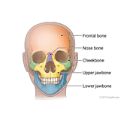Our Health Library information does not replace the advice of a doctor. Please be advised that this information is made available to assist our patients to learn more about their health. Our providers may not see and/or treat all topics found herein.
Facial X-Ray
Test Overview
A facial X-ray is a series of pictures of the bones in the face. One type of facial X-ray (called a paranasal sinus X-ray series) looks at the air-filled cavities (sinuses) around the nose and eyes.
A facial X-ray helps find bone fractures, tumors, foreign objects, infections, and abnormal growths or changes in bone structure or size. An X-ray of the eye (orbital cavity) may be taken if the eye has been injured. A computed tomography (CT) scan may be needed to check any problems seen on X-ray.
Why It Is Done
A facial or sinus X-ray may be done to:
- Find problems of the sinuses of the face and nose, such as sinusitis or abnormal growths (polyps or tumors).
- Find fractures of the facial bones and nose.
- Check the bones around the eye (orbital cavity).
- Check the sinuses before surgery.
- Check for metal objects around the eyes before a magnetic resonance imaging (MRI) test.
- Look for the cause of pain in the face.
How To Prepare
In general, there's nothing you have to do before this test, unless your doctor tells you to.
How It Is Done
You will need to remove any jewelry that may be in the way of the X-ray picture. You will also need to remove glasses or dentures. You may be asked to lie on an X-ray table or sit in a chair. Several views (a series) of X-ray pictures are needed for clear pictures of the face. Your head may need to be repositioned for each view. Hold your head completely still while the pictures are being taken. A padded brace, foam pads, a headband, or sandbags may be used to hold your head in place while the pictures are taken.
If pictures of the orbital cavities or sinuses are needed, you will probably sit up while they are taken. A padded brace may be used to hold your head still while the pictures are taken.
How long the test takes
Facial X-rays usually take about 10 to 20 minutes. You will wait about 5 minutes until the X-rays are processed in case repeat pictures need to be taken. In some clinics and hospitals, X-ray pictures can be shown right away on a computer screen (digitally).
Watch
How It Feels
You won't feel any pain from the X-ray itself. You may find that the positions you need to hold are uncomfortable or painful. This is more likely if you have an injury.
Risks
There is always a slight chance of damage to cells or tissue from radiation, including the low levels of radiation used for this test. But the chance of damage from the X-rays is extremely low. It is not a reason to avoid the test.
If you need an X-ray during pregnancy, a lead apron will be put over your belly to protect the baby from exposure to radiation from the X-rays. The chance of harm is usually very low compared with the benefits of the test.
Results
In an emergency, the doctor can see the initial results of a facial X-ray in a few minutes. Otherwise, a radiologist usually has the official X-ray report ready the next day.
Normal:
- The bones of the face and orbital cavity are normal in size and shape.
- No foreign objects or abnormal growths are present.
- No broken bones are present.
- The sinuses are clear. No inflammation or infection is present.
Abnormal:
- Foreign objects, such as fragments of metal or glass, may be present.
- Broken bones, such as the nasal bones or bones around the eye (orbital cavity), may be present.
- Signs of a disease that affects the bones of the face or orbital cavity may be present.
- Abnormal growths (tumors) are present.
- Signs of sinusitis, such as fluid in the sinuses or a thick tissues lining the sinuses, may be present.
Related Information
Credits
Current as of: July 31, 2024
Author: Ignite Healthwise, LLC Staff
Clinical Review Board
All Ignite Healthwise, LLC education is reviewed by a team that includes physicians, nurses, advanced practitioners, registered dieticians, and other healthcare professionals.
Current as of: July 31, 2024
Author: Ignite Healthwise, LLC Staff
Clinical Review Board
All Ignite Healthwise, LLC education is reviewed by a team that includes physicians, nurses, advanced practitioners, registered dieticians, and other healthcare professionals.
This information does not replace the advice of a doctor. Ignite Healthwise, LLC disclaims any warranty or liability for your use of this information. Your use of this information means that you agree to the Terms of Use and Privacy Policy. Learn how we develop our content.
To learn more about Ignite Healthwise, LLC, visit webmdignite.com.
© 2024-2025 Ignite Healthwise, LLC.





